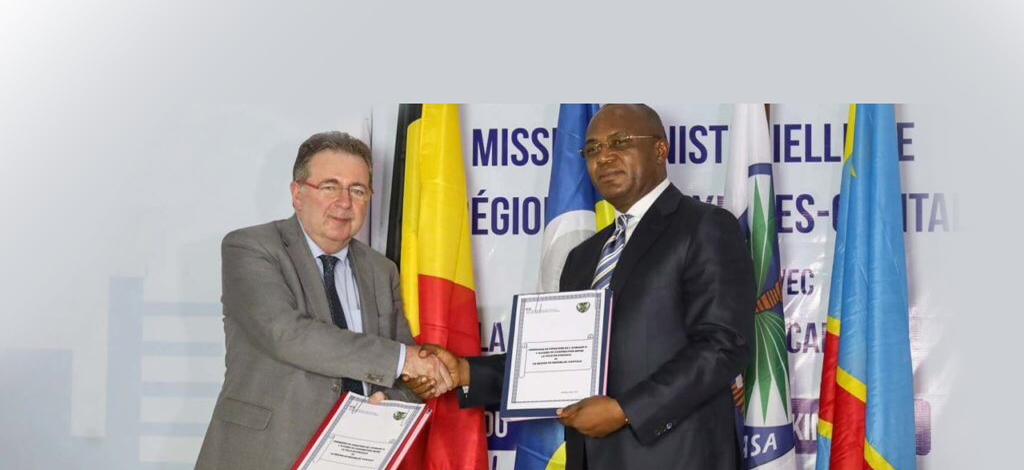The Brussels-Capital Region strengthens its ties with Kinshasa during an official mission
From 19 until 25 March 2022, Minister-President of the Brussels-Capital Region (BCR) Rudi Vervoort led an important mission to Kinshasa, the first in Congo since 2016. The Minister-President pointed out that the mission marked a new start, in addition to expressing his hope that many others would follow.
The official visit to Kinshasa was organised within the context of a triregional trade mission led by the BCR. The programme focused on political, cultural, and academic matters as well as development cooperation within the framework of the partnership between the Brussels-Capital Region and the City-Province of Kinshasa.
The mission, which was postponed twice due to the coronavirus pandemic, was prepared in close collaboration with the Brussels State Secretary responsible for Foreign Trade and International Relations, Pascal Smet. Unfortunately, he was unable to join after testing positive for COVID-19.
The Brussels delegation included elected officials and senior civil servants of the Brussels-Capital Region and the City of Brussels as well as several representatives of Brussels, Walloon and Flemish companies, universities, cultural institutions and civil society. The emphasis was on digitalisation, circular economy, health and culture.
 |
 |
Good economic prospects
Although it is still too early to draw conclusions, the economic outlook was seems to be positive. New visits will be necessary in the coming months but several Brussels companies were already able to conclude important agreements with their Congolese counterparts, in the fields of telemedicine, textile, construction and the environment.
Representatives from Brussels and Kinshasa were also able to share experiences and needs during several seminars on the Congolese economy as well as discuss existing opportunities in the construction industry, the environment and digitalisation.
Strengthening development cooperation
Minister-President Rudi Vervoort and the Governor of Kinshasa, Gentiny Mbaka Ngobila, signed an addendum to the original development cooperation agreement of 2016 between the BCR and the City-Province of Kinshasa.
The amendment outlines new, concrete avenues for collaboration, in addition to underscoring the signatories’ common desire to update and intensify their cooperation based on Kinshasa’s needs, in particular in terms of digitalisation and sanitation. The text of the addendum underscores the environmental aspect, evoking the possibility of technical support for the management of household waste, a priority for the Congolese capital.
The signatories will also cooperate to digitalise the Civil Registry. The Governorate will soon develop a proposal for a pilot project in Kintambo, one of Kinshasa’s 24 communes, which is twinned with the Commune of Uccle.
The delegation also visited projects that received funding as part of the call for projects in the South by Brussels International. They included CIProC, a project that promotes the entrepreneurship of Congolese women, which made a strong impression. The meetings within the framework of the Leaving No One Behind project, which is dedicated to the socio-economic empowerment of the LGBTQI+ community, were also very emotional.
 |
 |
Finally, in the margin of the financial support that the BCR has provided for over 10 years to UNICEF’s WaSH programme in the Democratic Republic of Congo, the delegation met with pupils of Kibunda School in Nsele. The school now has a well thanks to a borehole with a capacity of 2,000 litres. Six new separate latrines for boys and girls were also built thanks to the funding.
An important cultural component
Artists from both capitals have been exchanging experiences for many years, as evidenced by the Connexion Kin festival, the ‘Histoires de Miroirs’ project of the Academy of Fine Arts of Kinshasa and the Royal Academy of Fine Arts of Brussels in partnership with Vrije Universiteit Brussel (VUB), or the Living Traces project of KANAL-Centre Pompidou.
 |
 |
Culture thus played an important part in this mission, giving the delegation an opportunity to discover the works of Congolese and African artists as part of Geraldine Tobé’s ‘Esprit des Ancêtres’ project. The painter, who is at the forefront of a new Kinshasa-based wave of art, opened the doors of her studio for an overview of the work of several talented contemporary African artists.
 |
 |
Active presence of our universities in the DRC
At the academic level, finally, the mission also highlighted the efforts of the Université libre de Bruxelles (ULB) and Vrije Universiteit Brussel (VUB). Both these academic institutions have a very active presence in the DRC. They presented their activities and discussed new avenues for cooperation during a dedicated seminar. During the opening session, digitalised colonial archive documents were officially handed over to the Institut National des Archives du Congo (INACO) by professors of the ULB and the VUB, as part of the DIGICOLJUST research and digitalisation project, which has received support from the Federal Science Policy. The ULB has also signed an agreement with the National Order of Architects of the Democratic Republic of Congo, which formalises and perpetuates ten years of intense collaboration.




